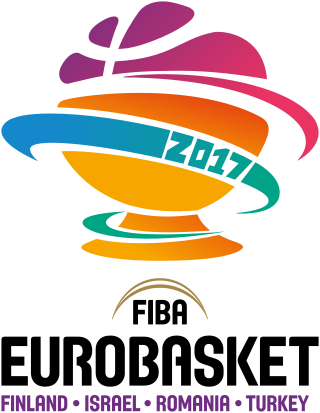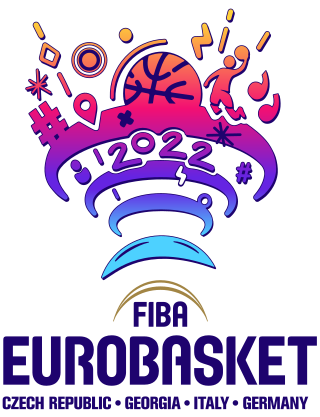
The Portugal men's national basketball team represents Portugal in international basketball competition. The team is controlled by the Portuguese Basketball Federation.

The 2007 FIBA European Championship, commonly called FIBA EuroBasket 2007, was the 35th FIBA EuroBasket regional basketball championship held by FIBA Europe, which also served as Europe qualifier for the 2008 Summer Olympics, giving a berth to the champion and runner-up teams. It was held in Spain between 3 September and 16 September 2007. Sixteen national teams entered the event under the auspices of FIBA Europe, the sport's regional governing body. The cities of Alicante, Granada, Madrid, Palma de Mallorca, and Seville hosted the tournament. Russia won its first EuroBasket title since the dissolution of the Soviet Union, by defeating hosts Spain, with a 60–59 score in the final. Russia's Andrei Kirilenko was voted the tournament's MVP.

The Great Britain men's national basketball team represents Great Britain in international basketball competitions. The national team is administered by British Basketball.

The Georgia men's national basketball team represents the country of Georgia in international basketball matches, and is controlled by the Georgian Basketball Federation. Georgia became a member of FIBA in 1992, after they gained independence from the Soviet Union. The national team played their first official match against Poland in 1995.

The Belarus men's national basketball team represented Belarus in international basketball matches, and are controlled by the Belarusian Basketball Federation. They came into existence in 1992 after the dissolution of the Soviet Union. The team played in their first official match the following year versus Lithuania. They are Europe's most populous nation to have never qualified for a major international basketball competition.

The 2009 European Women Basketball Championship, commonly called EuroBasket Women 2009, was the 32nd regional championship held by FIBA Europe. The competition was held in Latvia from June 7 to June 20, 2009.

The 2013 European Women Basketball Championship, commonly called EuroBasket Women 2013, was the 34th regional championship held by FIBA Europe. The competition was held in France from 15–30 June 2013. This was the fourth time that the EuroBasket Women has been hosted by France.

EuroBasket 2015 was the 39th edition of the EuroBasket championship that was organized by FIBA Europe. It was co-hosted by Croatia, France, Germany, and Latvia, making it the first EuroBasket held in more than one country. It started on 5 September and ended on 20 September 2015.
The Israel women's national basketball team represents Israel in international women's basketball matches and is controlled by the Israel Basketball Association. Israel have hosted the FIBA Women's EuroBasket in 1991, and will host it again in 2023 along with Slovenia, they have automatically qualified as co-host.

EuroBasket 2017 was the 40th edition of the EuroBasket championship that was organized by FIBA Europe and held between 31 August and 17 September 2017. Beginning from 2017, the continental championships take place every four years with a similar system of qualification as for the FIBA Basketball World Cup.

The 2014 FIBA Europe Under-20 Championship was the 17th edition of the FIBA Europe Under-20 Championship. The competition was played in Crete, Greece, from 8 to 20 July 2014. The winners were Turkey. To win the title they beat Spain with a score of 65–57. It was their first ever title win. The runners-up were Spain and third place were Serbia. Defending champions from 2013, Italy, came in at tenth place, their worst result since 2010.
Group E of the EuroBasket Women 2015 took place between 17 and 21 June 2015. The group played all of its games at Főnix Hall in Debrecen, Hungary.

The 2017 European Women Basketball Championship, commonly called EuroBasket Women 2017, was the 36th edition of the continental tournament in women's basketball, sanctioned by the FIBA Europe. The tournament was awarded to Czech Republic after winning the bid to Serbia. The tournament also serves as a qualification for the 2018 FIBA Women's Basketball World Cup in Spain, with the top five nations qualifying. As hosts Spain finished in the top five, the sixth placed team also qualified.

The EuroBasket 2022 was the 41st edition of the EuroBasket championship organized by FIBA Europe. It was the first since it was agreed it would take place every four years, with a similar system of qualification as for the FIBA Basketball World Cup. It was originally scheduled to take place between 2 and 19 September 2021, but due to the COVID-19 pandemic and the subsequent postponement of the 2020 Summer Olympics to 2021, it was postponed to September 2022.
The 2019 FIBA Basketball World Cupqualification for the FIBA Europe region, began in August 2017 and concluded in February 2019. Contrary to previous years, no teams were automatically placed into the World Cup, so all FIBA Europe nations had to participate in qualification.

The 2019 European Women Basketball Championship, commonly called EuroBasket Women 2019, was the 37th edition of the continental tournament in women's basketball, sanctioned by the FIBA Europe. The tournament was co-held in Latvia and Serbia from 27 June to 7 July 2019.
This page describes the qualification procedure for EuroBasket Women 2019.

The EuroBasket 2022 qualification was a basketball competition that was played from November 2017 to February 2021, to determine the 20 FIBA Europe nations who would join the automatically qualified co-hosts Czech Republic, Georgia, Italy, and Germany at the EuroBasket 2022 finals tournament.
This page describes the qualification procedure for FIBA Women's EuroBasket 2021. 14 teams joined the co-hosts France and Spain.
This page describes the qualification procedure for EuroBasket Women 2023. 14 teams joined the co-hosts Israel and Slovenia.























